Bringing ideas into being, can perhaps at times- feel like the most didactic endeavour of human pursuit; governed by a myriad of disciplines that have fashioned the ecologies of artistic landscapes through century’s past – each with its own essence and capability to illustrate a message. We orate, narrate and create with conscious or unconscious intention, and in doing so leave gentle footnotes that express our identity and intuitive capacities. Tiago Rodrigues’ work strikes me as one such endeavour; intuitive messages, to an audience left entirely to come to their own interpretations. His nuanced craftsmanship is embodied by sculptural techniques and emboldened typographic structures. His work holds a signature of sincerity and authenticity quite often sidelined in contemporary spaces of creation — with both sentiments undefined; yet, somehow deeply steeped in a mysterious authorship of his own words translated into a direct and tangible form. Tiago’s work is on the axis of deliberate thinking and perceptions of a polarising world, yet, delivered with subtlety and a quiet sense of humility.
There are many works to discuss, archived beautifully on the artist’s website, each noted with a potent title. Included among them are The Sound of My Voice; Until Next Time; Together towards our Hopes and Dreams – and many more – all laid out in a minimalistic format. Each work, medium and contrast of materials is emotive and provoking, with undertones of a conflicted responsiveness and reactivity to the mundane and monotonous limitations imposed by daily existence. A response rooted in a signalling of pain, sensitivity and still; a quiet ebbing subsequent “hope”. As he unpacks ideas such as “all is not lost” and “all can be forgiven”, and in viewing the work – I am somehow reminded that it is okay to be fragile and gentle. That it is okay; to require others to ensure that “we are handled with care” – a phrase taken from the mechanisation of the modern age in reference to objects, yet, a mechanisation that gains deep sentiment when applied to human subjectivities. This phrase can be seen in Tiago’s latest prints born from the limitation of lockdown, rendered without access to his studio – inaccessibility and alienation from one’s craft is a special kind of dread. However, it seems that this is Tiago’s principle synthesis of expansion as an artist; by drawing on the painful limitations of living, the disappointments and underwhelming outcomes caused by being human – arises a body of work that is unequivocally committed to exploring, reworking, redefining and perhaps in particular; healing. This is the dynamic signature of an artist, their ability to turn suffering into beauty thus alchemizing one’s deepest pain in service of creativity.
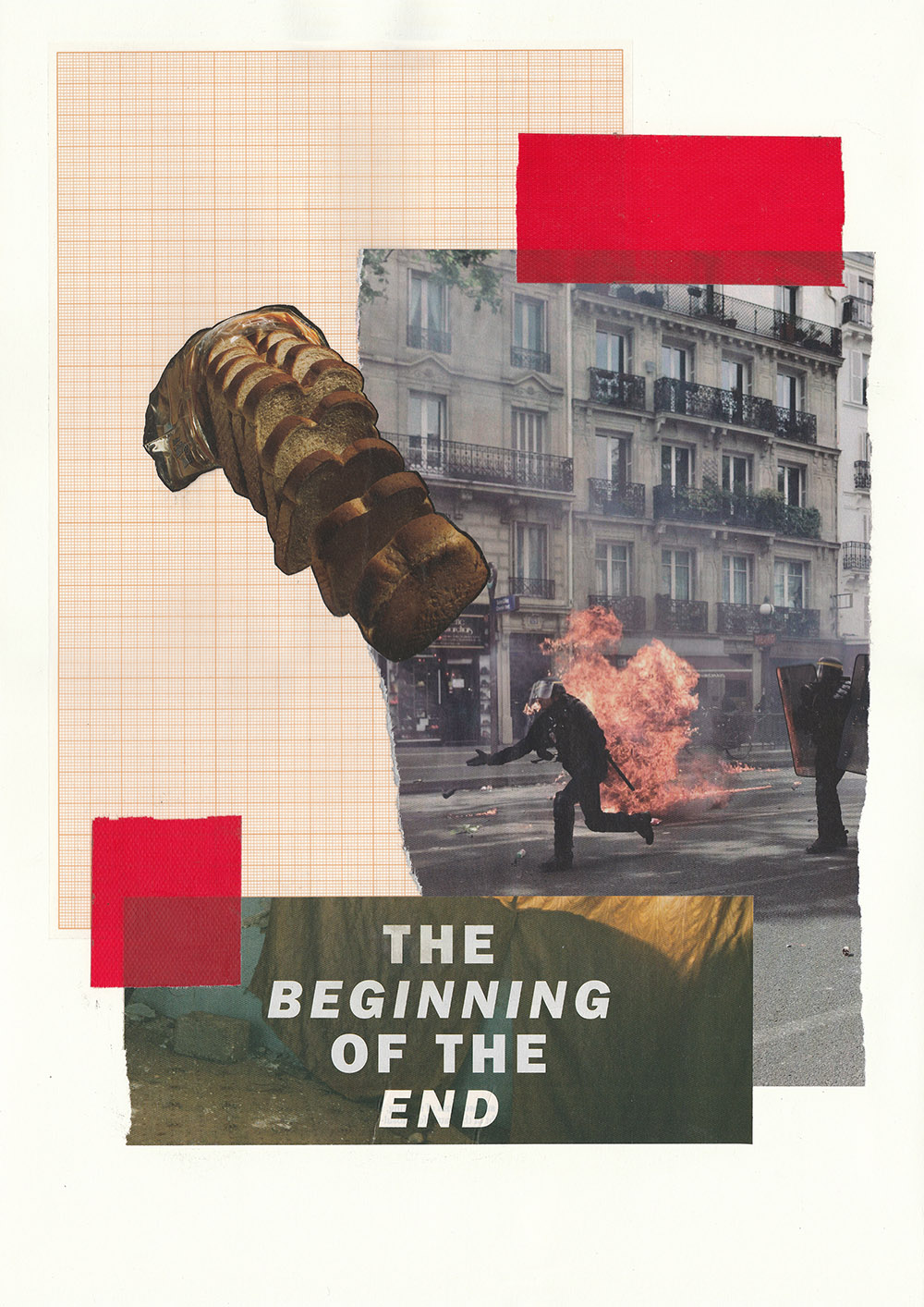
Untitled VX, 2020
Perhaps, the themes that Tiago explores can be interpreted as a personal statement against a profoundly distorted expression of mainstream masculinity. That of generations of men taught and skilled at the art of oppression; of others and of themselves by virtue of repression; scarred and without salve for their wounds. The broken go onto torment the rest – this is well known. I wondered about this when viewing images of No Gods No Masters, a typographical construction; a succinct take on our constructed illusory relationship to authoritarianism, “where are the Gods or Masters of our societal landscape” I ask? Other works find form through the mediums of wood, steel and some aspects of needle work – one in particular from 2016 titled The Fool; a backdrop of sewn balaclavas denoting both anonymity and confrontation. Tiago has participated in a number of exhibitions, solo shows as well as larger exhibitions – his work continues to be an intriguing, ongoing conversation that leaves a lasting impression of existential consideration.
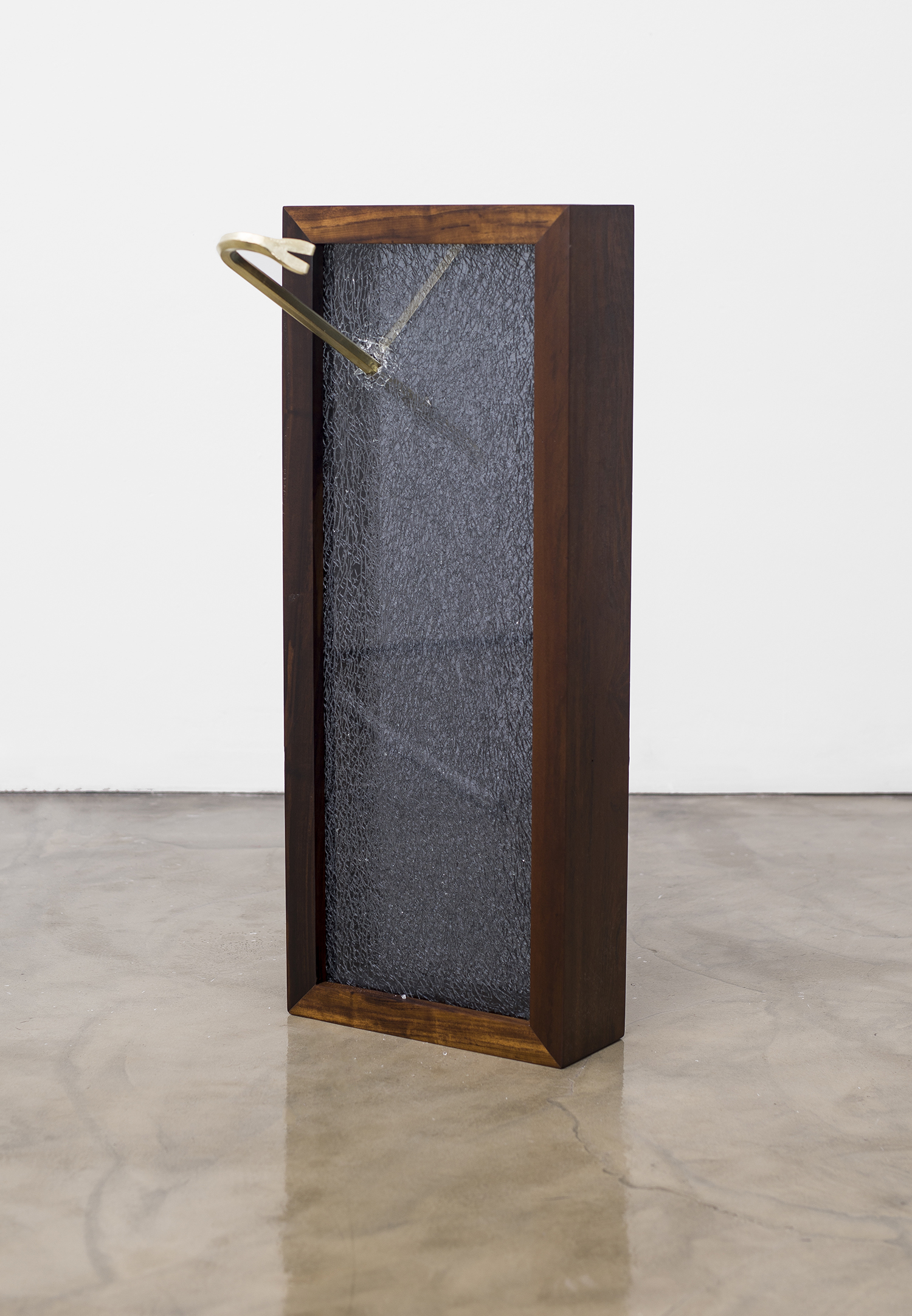
Still Waiting III, 2018
Your work feels really evocative and the craftsmanship is beautiful – where did you first draw on the technique in woodwork and why?
Tiago Rodrigues: I’ve always been interested in building and making things but the obsession around woodwork began in 2011. I started working as a studio assistant for the sculptor Stuart Bird and his practice had a huge impact on the work I’ve made. Bird’s work is extremely well crafted and he showed me ways of thinking and making that changed everything for me. I guess the reason I’ve adopted an attention to detail — and it isn’t always a comfortable way of making — is to translate the idea of penance. There’s [a] stoic nature to these processes and I’ve used them as a way to work through difficult spaces in my life. Maybe people can feel that transference of energy in the work, maybe they can’t – but it’s a necessary part of my process.
I have read that much of your work deals with themes of transgressions and that this kind of rebellious spirit really is notable, yet, subtle when viewing the work. Is this a perspective you have carried out through your career, and can you elaborate a bit on the notions of transgressions as a response to the limitations of society?
Tiago Rodrigues: I think a lot of people grow up around music driven subcultures, or at least I did. I grew up around 70’s and 80’s punk. This is where the rebellious influence began, my worldview was created around the messages of these groups and individuals. I guess at some point I started looking for substance to back these views. The more I looked for this I started seeing that society thrives on binaries and distinctions. These boundaries aren’t natural universal laws, they were constructed and imposed on the world. The great thing about constructs is that we’re able to disrupt, destabilise, deconstruct and transgress them. The rejection of these distinctions — and my experience of them — is where I try to situate the work I make.
I feel the most poignant art is when an artist creates and leaves the rest up to the viewer / audience without very much context. It seems to create an unspoken dialogue of interpretation and conversation, do you hold this idea within your vision of eliciting a reaction within the viewer?
Tiago Rodrigues: This is something that I’ve struggled with. I completely agree, as a viewer I don’t want to be guided through my experience, however, I still feel context is important to at least show you where the path is. After this, I think the viewer should be left to choose how they want to go down that path and the information they find important along the way. The difficulty is that sometimes the work is so personal that there isn’t any common context, and when I start talking about it, I don’t think I make much sense. I also don’t want those who like to know more about the work feel as though they aren’t allowed to ask, the art world already has enough elitists and I don’t want to be a part of that. I think my work isn’t heavily research based to the point where you would need supplementary reading to experience it. My ideal situation would be that every viewer projects their own experience onto the work, and for it to take on meaning according to what they need or want to experience.
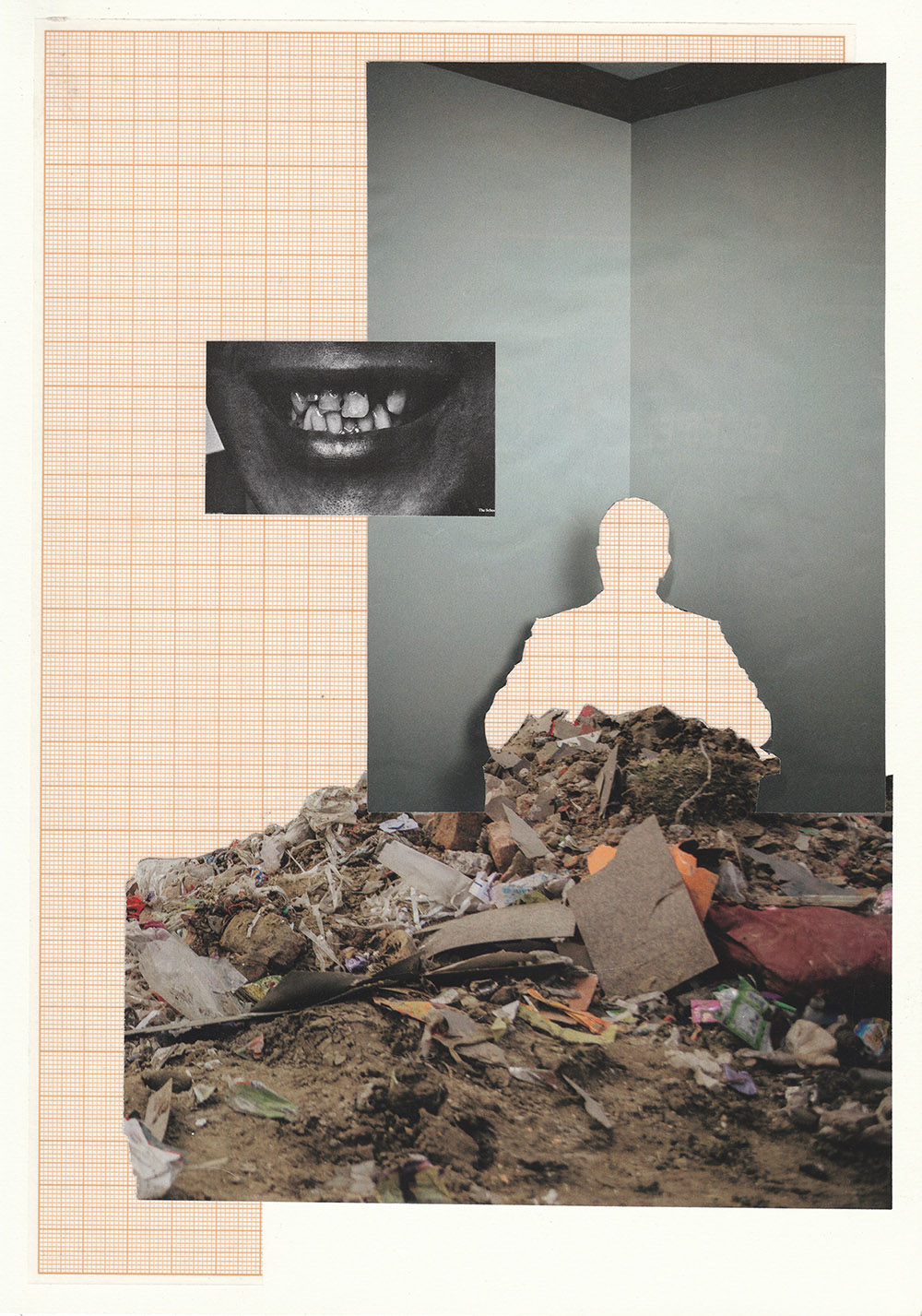
Untitled XVII, 2020
Your recent Print series as a response to lockdown really spoke to the mood of the moment; thoughtfully juxtaposed images of broken, catastrophic proportions. Has lockdown shifted anything in terms of your commitment to your craft?
Tiago Rodrigues: Not being able to go to my studio has been difficult in terms of production, I’m not one of the lucky ones whose practice is flexible enough to move to their living spaces. I need machines and space. The thing is, I actually started making some of those collages in January, I make these when I’m struggling to focus on new ideas. I don’t usually put them out into the world but I guess there’s nothing usual about life at the moment so I decided to show some of them. It just so happens that the subject matter and content that has always interested me is currently very obvious to some people. I was talking about this to a friend of mine the other day, she and I were joking that my pessimism might finally have a place in the art world.
Your most recently posted work; every lie we tell incurs a debt to the truth, provoked a lot of my own feelings around dishonesty and its occurrence in my life, whether my own lies or others. Thank you for this. Could you elaborate on this new body of work a bit?
Tiago Rodrigues: Some of the works I’ve been posting recently are part of a body of work for my next show. It was going to open in August but the pandemic changed that and it’s been postponed for now. So, I guess I don’t want to give too much context to it yet. But briefly, this work focuses on construct of truth, looking at what leads to dishonesties. When people interact — there is an ongoing internal negotiation of desire. In this case the desire to be truthful (regardless of the outcomes), the desire to benefit your preferred outcome, and the desire to please others. But the choices we make don’t exist outside of consequence – and I suppose that’s a brief insight to the work. I have a working title for the show, but it’ll likely change a good couple of times. So far, the one I’m liking at the moment is Easy Come, Easy Go, but I’m still feeling things out.
What is your current take on contemporary art in South Africa, what are you feeling about the landscape? Of course, there is massive uncertainty but we need emotive art more than ever.
Tiago Rodrigues: I’ll probably regret saying this, but I have to. I feel there are a lot of galleries that have created value around work that is palatable and can be commodified easily and the work that takes some effort to access is being pushed aside. Artists are forced to rely heavily on the market for success instead of it being the other way around, somewhere I think people forgot that. Besides that, I’ve noticed a couple of galleries hosting virtual shows as a way of working around the pandemic. Don’t get me wrong this is great. I don’t think this complements everyone’s work though, especially the work that is experiential and takes effort to access thematically. I don’t think those kinds of shows can have the same effect from behind a screen.
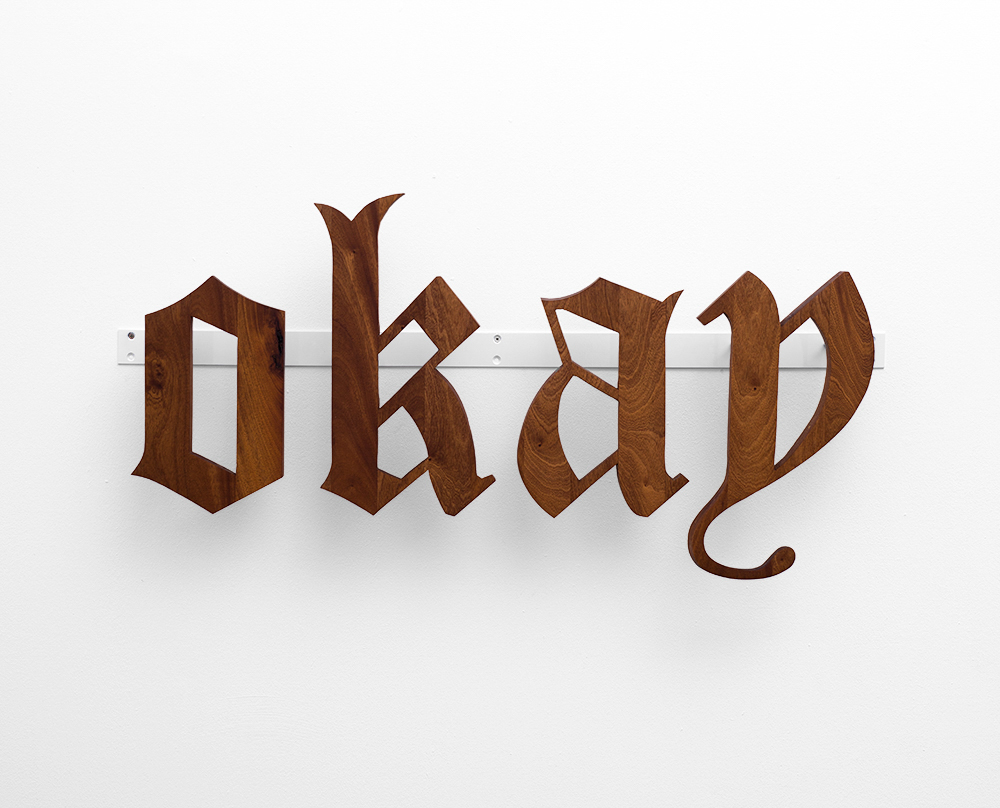
YIP, 2018
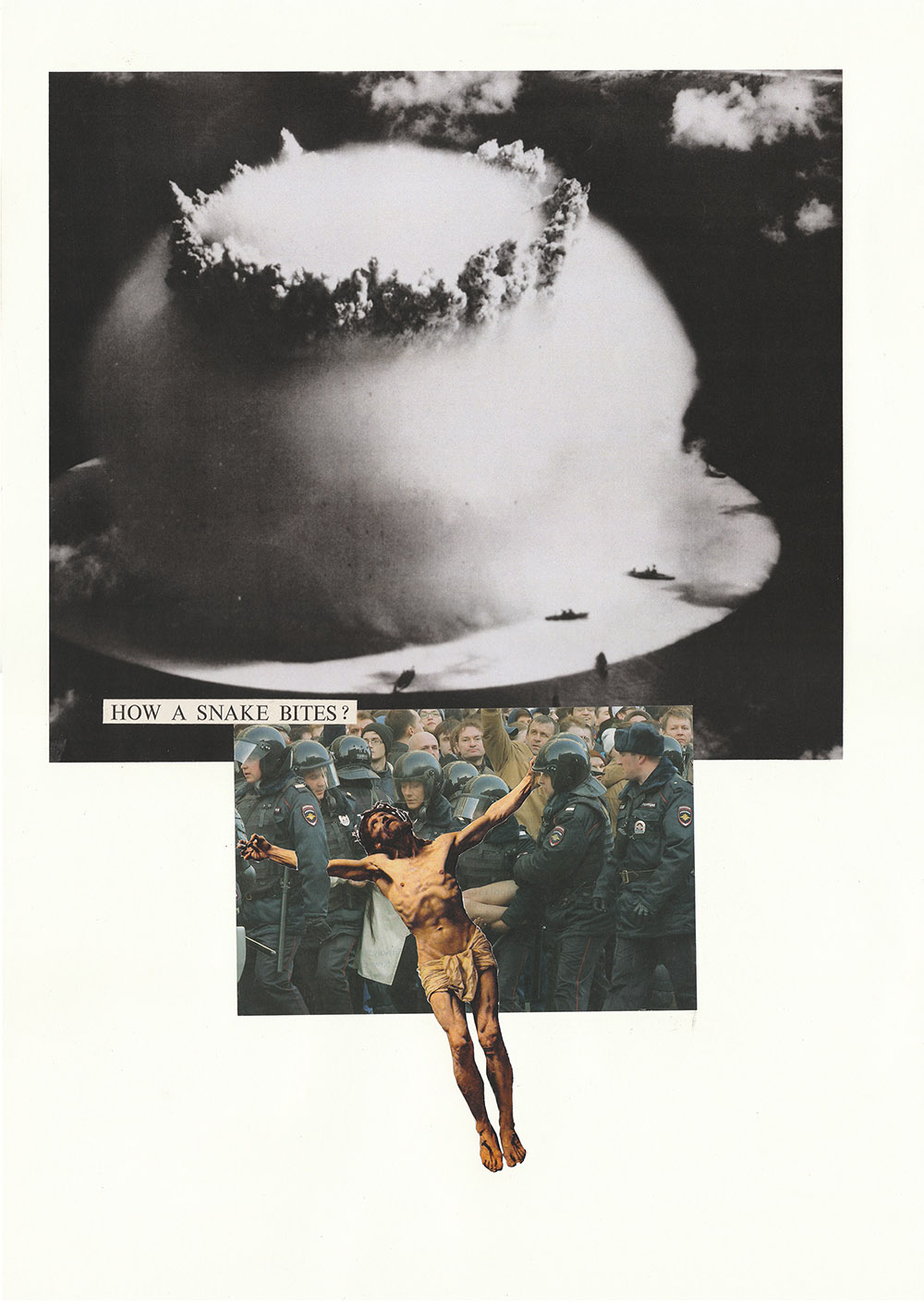
Untitled IV, 2020
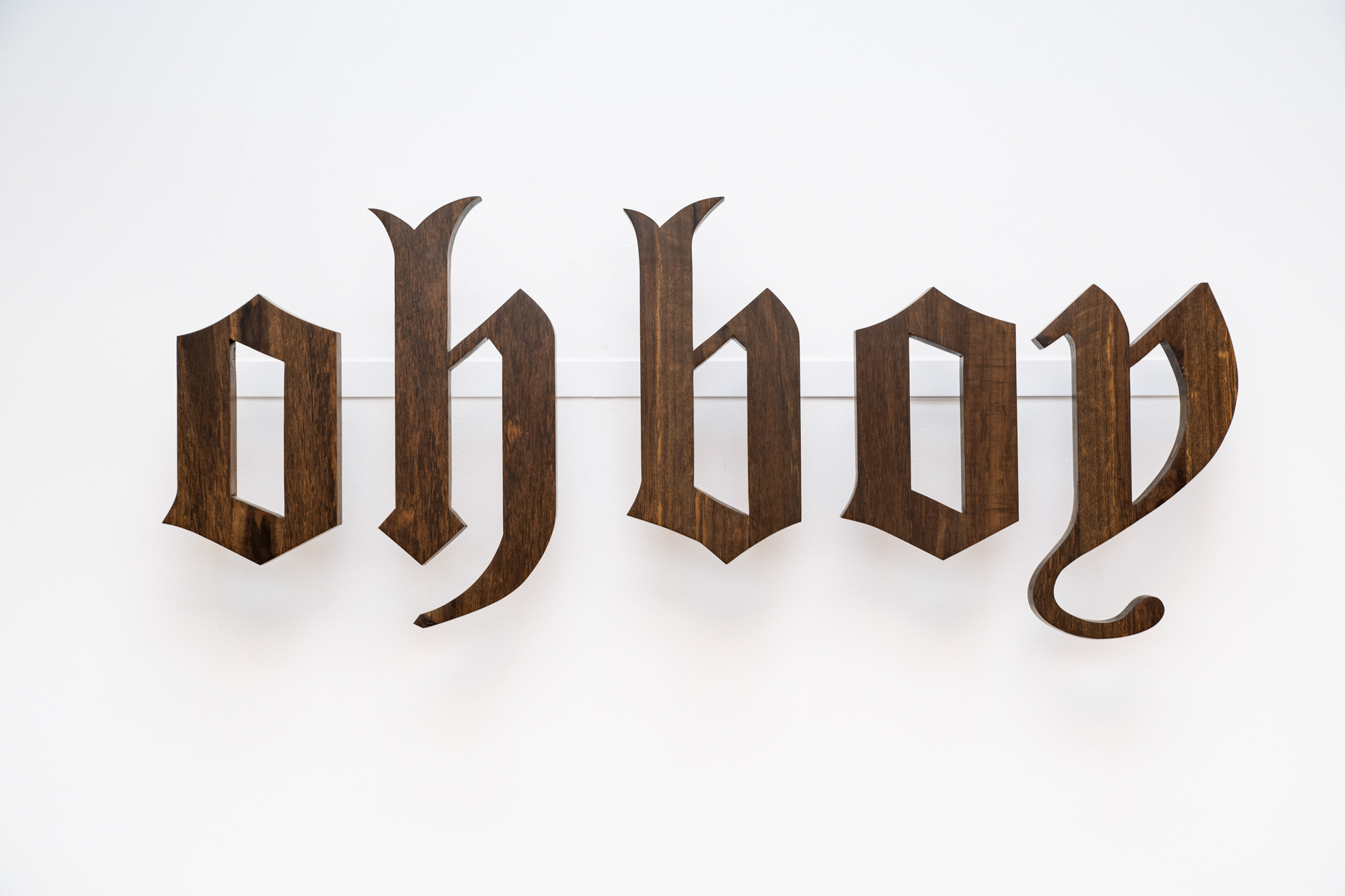
Until Next Time, 2019



















































